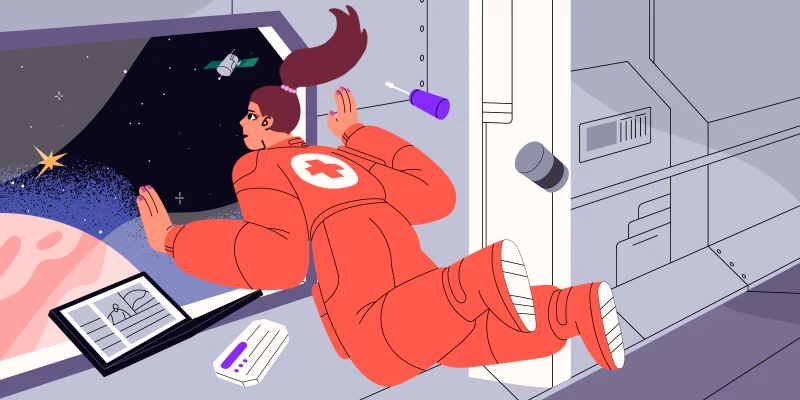“Oh geez, it’s one of these.”
My head turned almost instinctively toward the scheduling desk at the surgical office to which I had been assigned. Since it was the first month of my first clinical rotation, I admit that I was a little jumpy at just about everything, but the derision that glazed the medical assistant's voice was especially startling. Until this point, I had received nothing but encouragement and positive energy in the clinic; that day in particular felt effortless. We were working through patients ahead of schedule, every symptom was textbook, and our patients’ schedules were suspiciously easy to coordinate with the OR’s schedule. So — what fragile mechanism of our well-oiled machine had suddenly broken down?
The assistant looked up and noticed my curiosity. “Oh yeah,” they almost purred, “you like these people, this one will be good for you.” They offered me the patient chart of a recent check-in.
The patient did not seem to be very unusual on paper: a middle-aged woman with postprandial epigastric and right upper quadrant pain. This chart even came with a right upper quadrant ultrasound showing stones collecting in the gallbladder. By all accounts, this was the clinic’s bread and butter. With the shakiness of a medical student not wanting to reveal just how out of place they felt, I probed into why this patient should be so interesting to me.
“Just look at their med list!” the assistant said as she turned toward me. “You’re the student that wants to do psych, right?” There it was, a single line blending into the jargon of a referral note, “Sertraline 100 milligrams QD.” This patient was given to me not because they were an easy surgical case, but because their past medical history included psychiatric pathology, and since I had told everyone of my intent to match into psychiatry, I seemed to be the best fit. The medical assistant continued, “They are just so hard to deal with sometimes. They ask a lot of questions, and half the stuff they come in about is just in their head.”
All I could do was nod my head and smile. I was stunned by what I was hearing.
My meeting with the patient went smoothly, and a couple of days later, I scrubbed into an uneventful laparoscopic cholecystectomy that relieved the patient’s symptoms. Did the patient have a lot of questions for me regarding the surgery? Yes. Did she repeat a lot of those questions to the attending surgeon when they came into the exam room to check my work? Yes. But none of that should have mattered in the care of this patient. Why was it that this patient was labeled as “one of those?” Why would it have mattered?
Does the apprehension surrounding surgery have a different value in someone with mental illness versus someone without it? If this patient was sent directly to the attending, would the negative energy from the medical assistant infect the patient physician relationship, cankering what should be a simple interaction? How many patients with psychiatric diagnoses have received suboptimal care because offices and clinics viewed them as hard to deal with? These questions have continued to haunt me long after that rotation ended, in large part because this was not an isolated incident. If pessimism toward working with the mentally ill had a stench, our health care system would reek.
In a piece published by the American Psychiatric Association, the reality of mental health stigma and its negative consequences is made very clear: “More than half of people with mental illness don't receive help for their disorders. Often, people avoid or delay seeking treatment due to concerns about being treated differently or fears of losing their jobs and livelihood. That's because stigma, prejudice and discrimination against people with mental illness is still very much a problem.” The piece goes on to say that continued stigma surrounding mental health and psychiatric pathology can lead to a spectrum of negative outcomes — everything from the macro of reduced financial backing of psychiatric research and limited careers or living to the micro repercussions of lower standards of care for those with a mental illness.
In a recent national survey, 90% of young people 14 to 22 years old turned to online resources for mental health information, compared with 32% who reached out for professional assistance. An entire generation is getting more help from online sources of unknown credibility and motives than from trained clinicians sworn to the Hippocratic Oath — this should terrify us.
There is hope, however. Openness and warmth have been shown to make a substantial positive impact on the mentally ill. A stigma reduction campaign regarding recognizing signs of mental distress in California saw an increase in people seeking out and accessing mental health services. I have a love and a passion for this patient population; I feel drawn to helping them. That is why I am pursuing psychiatry. But psychiatric, medical, and surgical pathologies are not mutually exclusive. My future patients will inevitably also be your future patients and vice versa.
That day in clinic, there was a patient in pain who was seeking a solution to pathology unrelated to her mental illness. I was able to give her a compassionate ear to hear her concerns. Her care turned out well, and it is my expectation that all patients with mental illness can navigate the medical system without our stigma corrupting their care. The stigma toward those with mental illness diminishes our capacity as health care professionals. When we consciously choose compassion toward all, we will flourish.
What are your thoughts on mental health stigma in medicine? Share them in the comment section.
Joshua Hansen is a third-year medical student planning on matching into psychiatry. He is passionate about community-based medicine and advocating for those with mental illness.
Image by Pandagolik1 / Shutterstock





